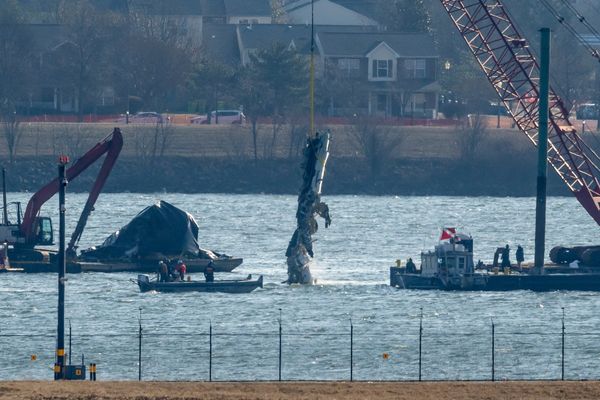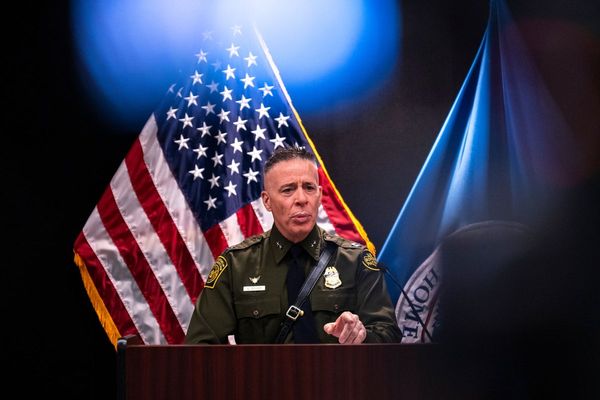The United States has expressed alarm over a "full-scale defence partnership" between Russia and Iran involving equipment such as helicopters, fighter jets and drones putting Ukraine and other countries at risk. The city of Odesa is suffering its worst power outages after Russian "kamikaze drone" strikes on Saturday. Meanwhile, the three winners of this year's Nobel Peace Prize, who received their awards Saturday, called for the fight to continue unabated against Russian leader Vladimir Putin's "insane and criminal" invasion. Read our live blog to see how all the day's events unfolded. All times are Paris time (GMT+1).
This live page is no longer being updated. For more of our coverage of the war in Ukraine, click here.
9:04pm: Ukraine says 1.5 million in Odesa region without power after Russia strikes
More than 1.5 million people in Ukraine's southern Odesa region are without power after Russian drone strikes on the electricity generating system, President Volodymyr Zelensky said in a video address on Saturday.
4:49pm: Arms dealer Bout praises Putin, backs Ukraine assault
Viktor Bout, a notorious arms dealer dubbed the "Merchant of Death", praised Russian President Vladimir Putin and backed Moscow's assault on Ukraine.
On Thursday, Bout, who was serving a 25-year sentence in a US prison, was exchanged in Abu Dhabi for American basketball star Brittney Griner.
Speaking to the Kremlin-backed RT channel in an interview released on Saturday, Bout said he kept a portrait of Putin in his prison cell in the United States.
"I am proud that I am a Russian person, and our president is Putin," the former Soviet air force pilot said in the 40-minute interview.
"I know that we will win," he added, saying he was enjoying snow and "the air of freedom" upon his return to Russia.
4:14pm: Russia grinds on in eastern Ukraine; Bakhmut 'destroyed'
Russian forces have turned the eastern Ukrainian city of Bakhmut into ruins, President Volodymyr Zelensky said, while Ukraine's military on Saturday reported missile, rocket and air strikes in multiple parts of the country that Moscow is trying to conquer after months of resistance.
Zelensky said the situation "remains very difficult" in several frontline cities in eastern Ukraine's Donetsk and Luhansk provinces. Together, the provinces make up the Donbas, an expansive industrial region bordering Russia that Putin identified as a focus from the war's outset and where Moscow-backed separatists have fought since 2014.
"Bakhmut, Soledar, Maryinka, Kreminna. For a long time, there is no living place left on the land of these areas that have not been damaged by shells and fire," Zelensky said in his nightly video address, naming cities that have again found themselves in the crosshairs. "The occupiers actually destroyed Bakhmut, another Donbas city that the Russian army turned into burnt ruins."
1:00pm: Russia aims to turn Ukraine into a 'dependent dictatorship', wife of jailed Belarusian Nobel laureate says
Russia wants to turn Ukraine into a "dependent dictatorship" like Belarus, the wife of jailed Belarusian Nobel Peace Prize laureate Ales Byalyatski said on Saturday upon receiving the prize on his behalf, speaking his words.
Byalyatski, Russian rights group Memorial and Ukraine's Center for Civil Liberties won the 2022 Nobel Peace Prize in October, amid the war in Ukraine that followed Russia's invasion of its neighbour.
Receiving the award on behalf of her husband at Oslo City Hall, Natallia Pinchuk said Byalyatski dedicated the prize to "millions of Belarusian citizens who stood up and took action in the streets and online to defend their civil rights".
"I know exactly what kind of Ukraine would suit Russia and Putin — a dependent dictatorship. The same as today's Belarus, where the voice of the oppressed people is ignored and disregarded," Pinchuk said on Saturday, quoting her husband.
Belarusian security police detained Byalyatski, 60, and others in July last year in a crackdown on opponents of the country's president, Alexander Lukashenko.
12:53pm: Rouble to replace Ukrainian currency in Kherson from January, pro-Russian official says
The Russian-installed administration of Ukraine's Kherson region said on Saturday that it had begun changing locally circulated Ukrainian hryvnia currency into Russian roubles, with hryvnia circulation in Moscow-controlled areas of the region to end on January 1.
In a video published on Telegram by the region's Moscow-appointed administration, Andrei Peretonkin, head of the Russian central bank's local branch, said: "For the sake of the convenience of residents and to allow for a smoother integration of the region into the Russian economic space, this week banks in Kherson region began currency exchange operations."
Previously, the Russian-installed administration had said that both the rouble and hryvnia would be accepted in the Kherson region.
12:51pm: Ukraine's Odesa without power after Russian drone attack
The southern Ukrainian city of Odesa was left without power on Saturday following a night-time attack by "kamikaze drones" launched by Russia, authorities said.
"As of now, the city is without electricity," Kyrylo Tymoshenko, deputy head of the presidential administration, said on the messaging app Telegram.
Only critical infrastructure including hospitals and maternity wards had access to electricity.
"The situation remains difficult, but is under control," Tymoshenko said.
Maksym Marchenko,the governor of the region of Odesa, said Russia had attacked the city with "kamikaze drones" overnight.
"As a result of the strike, there is no electricity in almost all districts and communities of our region," he said.
Two drones were shot down by Ukrainian air defence units, Marchenko added.
11:31am: US sounds alarm over Russia-Iran full defence ‘partnership’
The United States on Friday expressed alarm over a "full-scale defence partnership" between Moscow and Tehran, describing it as "harmful" to Ukraine, Iran's neighbors and the world.
Washington has previously condemned Iran-Russia security cooperation, but on Friday described an extensive relationship involving equipment such as helicopters and fighter jets as well as drones, with the latter items resulting in new US sanctions.
"Russia is seeking to collaborate with Iran in areas like weapons development, training," White House national security spokesman John Kirby told reporters.
Moscow "is offering Iran an unprecedented level of military and technical support – that is transforming their relationship into a fully fledged defence partnership," he said.
"We have also seen reports that Moscow and Tehran are considering the establishment of a joint production line for lethal drones in Russia. We urge Iran to reverse course (and) not to take these steps."
Moscow's UN envoy Vassily Nebenzia pushed back later in the day, telling a Security Council meeting that "the military industrial complex in Russia can work perfectly fine and doesn't need anyone's assistance."
10:47am: Russia pursuing 'wanton destruction' in Bakhmut, Ukraine says
As fighting continues in the city of Bakhmut, Donbas, Ukrainian forces face difficult decisions about whether to target attacks on buildings and infrastructure if Russian forces gain control.
“Ukrainian forces are very keen not to be the ones in a position of having to destroy cities,” says France 24’s Gulliver Cragg, reporting from Ukraine. “They want to protect their reputation as being the side that is more careful with infrastructure, while Russia is on a campaign of wanton destruction, as the Ukrainians put it.”
8:00am: Nobel Peace Prize ceremony to honour organisations at centre of Ukraine war
A trio representing the three nations at the centre of the war in Ukraine will receive the Nobel Peace Prize on Saturday, showing no sign of giving up the fight against Vladimir Putin and his Minsk ally.
Jailed Belarusian human rights advocate Ales Bialiatski, Russian human rights organisation Memorial, and Ukraine's Center for Civil Liberties (CCL) will be presented with their awards at a formal ceremony in Oslo.
2:23am: Australia to impose sanctions on Russia, Iran
Australia's foreign minister said on Saturday the government would place targeted sanctions on Russia and Iran in response to what it called "egregious" human rights violations.
Foreign Minister Penny Wong said in a statement Australia was imposing Magnitsky-style sanctions on 13 individuals and two entities including seven Russians involved in what the foreign minister said was the attempted assassination of former opposition leader Alexei Navalny.
In addition to human rights sanctions, Wong said Australia was placing further targeted financial sanctions on three Iranians and one Iranian business for supplying drones to Russia for use against Ukraine.
"The supply of drones to Russia is evidence of the role Iran plays in destabilising global security. This listing highlights that those who provide material support to Russia will face consequences," she said.
(FRANCE 24 with AFP, AP and Reuters)







